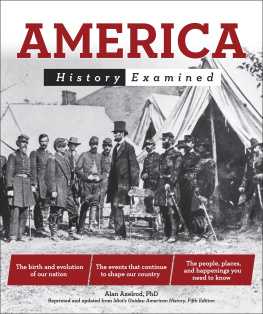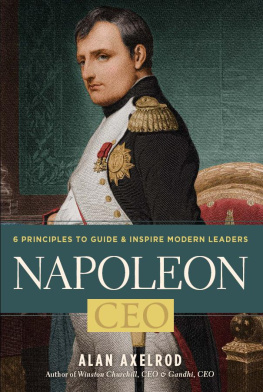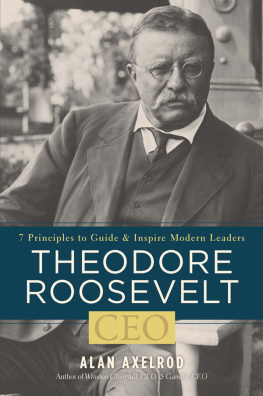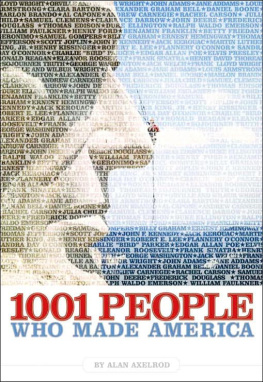

STERLING and the distinctive Sterling logo are registered trademarks of
Sterling Publishing Co., Inc.
2008 Alan Axelrod
All rights reserved. No part of this publication may be reproduced, stored in a retrieval system,
or transmitted, in any form or by any means, electronic, mechanical, photocopying, recording,
or otherwise, without prior written permission from the publisher.
ISBN 978-1-4027-4768-7 (hardcover)
ISBN 978-1-4027-9778-1 (paperback)
eBook ISBN 978-1-4027-9882-5
Library of Congress Cataloging-in-Publication Data
Axelrod, Alan, 1952
Profiles in folly : historys worst decisions and why they went wrong / Alan Axelrod.
p. cm.
Includes bibliographical references and index.
ISBN-13: 978-1-4027-4768-7
ISBN-10: 1-4027-4768-3
1. World history--Miscellanea. I. Title.
D21.3.A84 2008
909--dc22
2007041140
For information about custom editions, special sales, and premium and corporate purchases,
please contact Sterling Special Sales at 800-805-5489 or specialsales@sterlingpublishing.com.
2 4 6 8 10 9 7 5 3 1
www.sterlingpublishing.com
Cover design: Amy C. King Cover photographs: CORBIS. Left to right: Grigori Rasputin, General George Armstrong Custer, Richard Nixon, Prime Minister Neville Chamberlain. Roulette Wheel Burke/Triolo Productions/ Brand X/ CORBIS.
Lord, what fools these mortals be!
Puck, in Shakespeares A Midsummer Nights Dream
A WORD BEFORE WE BEGIN
T he unflinchingly unsentimental Katherine Anne Porter called her one full-length novel Ship of Fools (1962), after an allegorical figure that was frequently rendered in European woodcuts, paintings, and literature of the Middle Ages. These works depicted humanity as so many distracted passengers packed into a boat, all ignorant of and indifferent to the course on which they sail.
Im not quite so pessimistic. After all, I managed to collect a number of instances of extraordinary leadership, courage, and wisdom in my 2006 Profiles in Audacity. But my belief is this: All people are fools some of the time, and some people are fools all of the time, but all people are not fools all of the time. Still, history offers more than enough to fill this boat, and so I have chosen only those passengers whose actions illuminate the dark flipside of the subtitle of Profiles in Audacity: Great Decisions and How They Were Made. Here are tales of Historys Worst Decisions and Why They Went Wrong.
Profiles in Folly serves up some dumb decisions by stupid people and some evil decisions by evil people, but most of what youll find here are decisions by good, smart, savvy people that nevertheless went miserably, abominably, and often irreversibly wrong.
Why pick at historys scabs?
The easy answer is another question: Inching along the freeway, who can turn away from a flaming car crash?
The more meaningful answer is that probing our vulnerability is a project poignant and compelling precisely for what it reveals about the ways in which high-stakes decisionsdecisions that must be made and that cannot be evadedmay produce disastrous results. There but for the gracethe grace of what, precisely?lie us, in flames.
If the narrative vignettes of Profiles in Folly are intended to pique interest, satisfy curiosity, and, not least of all, deliver the occasional jolt of gee whiz, they are also meant to teach. Here are snapshots of decision-making processessome doubtless familiar to many of us, some simply bizarretogether with postmortems undertaken to explain what went wrong and why. Here are cautionary tales, albeit each with an exquisite twist ranging from acerbic to horrific.
One last word. Those who seek objective history are doomed to be disappointed by Profiles in Folly. For that matter, those who seek objective history from any writer are doomed to perpetual disappointment. No history is objective, save perhaps a set of old phone booksand even these limit their scope to people with sufficient means to buy a phone. Nevertheless, those who insist on reading both sides of a story will not always find what they want in Profiles in Folly for the simple reason that I make no claim to objectivity. When I see two sides to a story, I try to tell them both. But the truth, as I see it, is this: Not every story has two equally valid sides. Sometimes there is right, there is wrong; there is wisdom, and there is folly. And as the ump always says, I calls em like I sees em. So what if I wear glasses?

The Decision to
Gamble and Hope
THE DECISION TO LET DANGER IN
T hese days, uttering the phrase Trojan horse is likely to elicit a response such as, Did you lose any data? We think of a Trojan horse as a malicious software program that gets into computers by pretending to be something you want or need. You download a program that promises to rid your computer of viruses, for instance, and end up admitting into the inner sanctum of your virtual fortress a program that unleashes viruses.
As a label for malicious software, Trojan horse is derived from the Trojan War, an epic battle between Troy, which was located in what is now Turkey, and Sparta, a Greek city-state. Sparta won the battle after the Trojans were foolish enough to admit into their formidably fortified city a giant wooden horse they believed was a token of peace and submission from the Greeks. It was, to use another computer term, a fatal error.
The story of the Trojan War has come down to us through a mixture of history and mythology. In The Iliad, the Greek poet Homer tells us that the war was rooted in the marriage of Peleus to the sea goddess Thetis. The happy couple had neglected to invite Eris, the goddess of discord, to their wedding ceremony. Outraged, Eris crashed the wedding banquet and tossed onto the feast table a golden apple, announcing that it rightfully belonged to whoever was the fairest. That was sufficient to send Hera, Athena, and Aphrodite diving for the golden fruit, whereupon Zeus, chief among the gods, nominated a judge to award the apple and thereby determine who was the most beautiful. Since the prince of Troy, Paris, was universally deemed the handsomest man alive, Zeus reasoned that he was the most qualified to decide who among the three contenders deserved the apple.
Hermes, messenger of the gods, delivered Zeuss nomination, and Paris agreed. The three contenders did their best to move his decision in their favor, Hera promising him power, Athena wealth, and Aphrodite assuring him that he would enjoy the most beautiful woman in the world.
That turned out to be just the ticket.
Paris chose Aphrodite, who responded by promising that Helen, wife of Menelaus, king of Sparta, would become Pariss wife. Accordingly, Paris prepared to travel to Sparta for the purpose of taking Helen. His sister and brother, the prophetic twins Cassandra and Helenus, did their best to dissuade him, and in this they were joined by their mother, Hecuba; but heedless Paris was determined to collect the wife Aphrodite had promised him.
Menelaus, unsuspecting, greeted Prince Paris as a royal guest and treated him accordingly. But when the old king left Sparta to attend a funeral, Paris made his move. In some versions of the story, he snatched Helen away against her will. In others, moved by the young princes beauty and tired of life with the old king, Helen left with him willingly. In either case, the two were married in Troy about 1200 BC.
Next page













